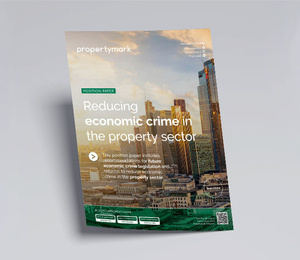What is money laundering?
Money laundering is the process of 'cleaning' money gained from criminal activity so that it appears to have been legitimately acquired.
The sheer size of the property market in the UK and the high value of property assets means that extremely large amounts of criminal funds can be ‘cleaned’ in a single transaction. Between 2016 and 2022, Transparency International report that an estimated £6.7bn of UK property has been purchased with wealth suspected to have been obtained from questionable funds.
Propertymark's position
The sales and lettings sectors, property auctioneers and high value dealers are all attractive targets for those looking to launder money. The UK housing market is a highly desirable options affected by financial crime.
Propertymark's influence
Inputting into global guidance for the real estate sector
In July 2022, the Financial Action Task Force (FATF), which is the global money laundering and terrorist financing watchdog, revised its Risk-Based Approach Guidance for the Real Estate Sector.
The UK’s regulation of money laundering ultimately derives from the FATF standards. The guidance highlights the importance for the sector to increase its understanding of the money laundering and terrorist financing risks it faces.
Our Policy and Campaigns Team were instrumental in helping draft the guidance through a project which CEPI co-lead with the Governments of Canada and the United States of America.
Campaign success
Register of overseas entities
After years of campaigning the UK Government introduced a public register of overseas entities owning property in the UK through the Economic Crime (Transparency and Enforcement) Act.
In 2018, we gave evidence to the House of Commons Treasury Committee Inquiry into Economic Crime and hosted a roundtable with civil servants from the Department for Business, Energy & Industrial Strategy (BEIS) and members of Propertymark who work as estate agents to review the UK Government’s proposals for a register of beneficial owners of overseas companies and other legal entities.
In 2019, we proved a written response to the Joint Committee on the Draft Registration of Overseas Entities Bill, and we responded to the HM Treasury consultation on the proposed steps that the government will take to transpose the Fifth Money Laundering Directive into national law.
Over recent years we have met with senior politicians lobbying for the introduction of the Register of Overseas Entities and in 2022 we ran a virtual roundtable with Propertymark members and Companies House inputting to help shape the usability and development of the Register.
related news
AML registration failures still the top cause of painful agent fines
HM Revenue and Customs (HMRC) has issued hundreds of thousands of pounds in new fines to property agents for failures to comply with anti-money laundering (AML) regulations, reinforcing the consequences of getting compliance wrong. The latest enforcement action covers the 2025–26 reporting period and includes 170 penalties issued to estate agency businesses, totalling more than £835,000. Letting agents are also within HMRC’s supervisory scope where transactions meet the required thresholds.
Single sanctions list launches on 28 January 2026 for simpler checks
All UK sanctions designations maintained by the UK Government will be consolidated into an official list and updated in one place. This is a significant operational change for property agents, auctioneers and other regulated businesses, which should make checking clearer and more straightforward. Sanctions compliance are part of wider financial sanctions and anti-money laundering obligations, and failures can carry serious legal and reputational consequences.
Propertymark at the table as officials shape money laundering reform
Head of Policy and Campaigns, Timothy Douglas, met senior officials at the Foreign, Commonwealth & Development Office (FCDO) on 8 December to discuss how economic crime affects the property sector, particularly the role of real estate in laundering illicit wealth and the regulatory gaps that can facilitate this activity. Meanwhile, the UK Government published its Anti-Corruption Strategy 2025, setting out plans to strengthen the UK’s defences against illicit finance.
UK Government confirms new AML supervisor — no change for property agents
The Financial Conduct Authority (FCA) will become the Single Professional Services Supervisor (SPSS) overseeing Anti-Money Laundering and Counter-Terrorism Financing (AML/CTF) compliance for the legal, accountancy, and trust and company service sectors. HMRC will continue to supervise agents under the Money Laundering Regulations, and firms that are already compliant do not need to make any changes to their existing AML procedures.
£10 billion could be laundered through the UK property sector every year
The 2025 National Risk Assessment (NRA) has once again placed the property sector in the spotlight as one of the most attractive ways for criminals to conceal illicit wealth. Complex ownership structures, offshore companies, and opaque trusts continue to disguise the identity of the individuals behind transactions, with both residential and commercial sales and lettings vulnerable.
Cracks in the system allow property crime to flourish
A BBC investigation has revealed that criminals used the UK Government’s unclaimed estates list to commit probate fraud. The list, published on the Gov.uk website, included details of around 6,000 estates left by people who died without a will or known heirs. It was taken offline in July 2025 after evidence showed fraudsters used it to submit fake wills and claim millions of pounds in assets.







